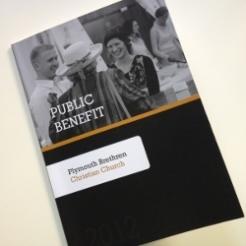The Charity Commission has said it will accept the registration of the Preston Down Trust, a congregation of the Plymouth Brethren Christian Church, after the trust agreed to make amendments to its governing document.
The Commission had refused to register the Trust as a charity in June 2012, saying it was concerned the Trust was not “established for exclusively charitable purposes for the public benefit”.
The Trust initially applied for charitable status in 2009 as a test case for the Brethren, a religious group with around 16,000 members in the UK and more than 50,000 worldwide, who practice a strict doctrine of separation that does not allow them to eat, drink or socialise with non-members. The Brethren operate more than 100 charities in the UK, including gospel halls and schools.
In July 2012, the Trust appealed the case to the Charity Tribunal. The Brethren also lobbied extensively in Parliament, asking MPs to support their bid for charitable status.
In January 2013, however, the Trust appealed for a stay of proceedings at the Tribunal, citing legal costs, and the Commission agreed to try to deal with the issue outside the Tribunal.
The Commission said it has received considerable evidence that there is significant “detriment or harm” in Brethren practices. It also had concerns that the original trust deed gave too much control to the worldwide leader of the Brethren, the minister of the Lord in the Recovery – a title currently held by an Australian, Bruce Hales.
In a decision document published today the regulator said the Trust had agreed a deed of variation to its original governing document. It said the amended trust deed “characterises an organisation with exclusively charitable objects for the public benefit.”
It said the Brethren was run predominantly for the benefit of members, but it nonetheless “had a beneficial impact through its instruction and edification of the public in a Christian way of life” and that limited access to its services was “not necessarily fatal to charitable status”.
The Commission decision also said that there were “elements of detriment and harm which emanated from the doctrine and practices of the Plymouth Brethren Christian Church” which had “a real danger of outweighing public benefit”, particularly the impact of its practices on those who left, and on children within the Brethren.
However it said that the Brethren “acknowledged past mistakes, demonstrated a willingness to make amends and proposed to address these issues by amending its trust deed, clearly setting out its doctrine and practices, including highlighting the concept of showing compassion to others”.
It also said the new deed of variation, “sets out, in a manner binding on the trustees, the church's core religious doctrines and practices,” in a way which reduced the ability of the current and futures ministers of the Lord in the Recovery to change future doctrine.









